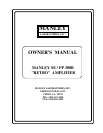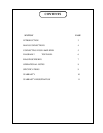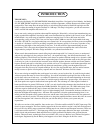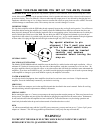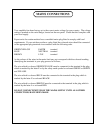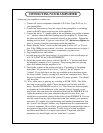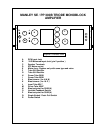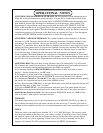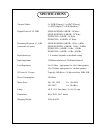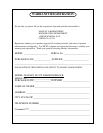
CONNECTING YOUR AMPLIFIER
Setting up your amplifiers is rather easy.
1. Connect all source components (turntable, CD, Tuner, Tape DAT, etc.) to
your preamplifier.
2. Connect the interconnects from the output of the preamplifier or switching
center to the RCA input on the top rear of the amplifiers.
3. Connect the hot or "+" speaker cable to the red binding post and the common
or "-" speaker cable to the black binding post (See diagarm 2). Ensure that
the other end of the cable is connected correctly to the speaker. Tighten the
binding posts by hand. If you use a nut-driver (3/8") do not over-tighten the
posts or you may break the connections inside the amplifier.
4. Ensure that the "mains" switch on the front panel is in the "off" or "0" posi-
tion. If the 300Bs are not inserted - do it now - the instructions are on page 4.
5. Turn on Preamplifier and any source components you plan to use.
6. Plug Amplifiers into wall outlets.
7. Set both amps up at the same settings. A good place to start is both amps set
to S / E 18 WATTS and 3 dB of FEEDBACK.
8. Switch the square mains power switch to the ON or "1" position and allow
the amplifier a minute or so to 'warm up'. The glowing panel and glowing
tubes will indicate that the amplifier is on.
9. Turn up the volume on the preamp and enjoy. If something is "humming"
don't panic. All you need to do is use a "3 pin to 2 pin AC adapter" or
"cheater". If you don't have one they are available at most hardware stores
for about a dollar. Usually one amp will need it but sometimes both. This is
because a ground loop exists in the system. Too many grounds - You should
only have one.
10. Now, while music is playing, try switching to PUSH / PULL. The differ-
ence may or may not be subtle. Choose the mode you like best with this
music. Turn the FEEDBACK switch to 10. The volume has become quieter
so compensate for the difference at the preamp. Listen a bit until you are
used to this, then turn down the volume and turn back the FEEDBACK to 0.
Adjust the preamp for the same volume as the previous test. Now, you
should have a reasonable opinion of the effects of the FEEDBACK. You can
turn this control step by step to the position that best matches your speakers
and tastes. We suggest also experimenting with speaker placement now that
the "system" has changed. Another very important area for experimentation
is acoustic treatment. All too often a good system will sound mediocre due to
acceptance of the surface treatments. Usually a mix of a little broadband
absorbtion and diffusion is a major improvement. Carpet and other thin
treatments only absorb highs and can "unbalance" a system.



